What Writers Read: 35 Writers on Their Favourite Book
A love letter to reading, which comes out in paperback this week
“If there are no young readers and writers, there will shortly be no older ones. Literacy will be dead, and democracy - which many believe goes hand in hand with it - will be dead as well” - Margaret Atwood
Sometimes I forget that this newsletter is less than 2 years old and that the bulk of my work pre-exists it. Which is a lovely excuse to tell you about What Writers Read: 35 Writers on Their Favourite Book - which comes out in paperback this Thursday!
In 2022, I approached a publisher I loved, Bloomsbury, with an idea to raise money for the National Literacy Trust. I’d approach 150 writers, I said, and hope that 30 of them might agree to write a short passage about their favourite read, which I’d then edit into a small book. They joyfully agreed, and when I started approaching said favourite writers, we had such a great response, we upped it to 35. I never even got to the end of my long-list.
I could not then and still cannot now believe the calibre of the authors who agreed to contribute, for no fee whatsoever. It was an insight into how humility and success, kindness and clout, can be perfectly comfortable bedfellows.
Elizabeth Strout, Elif Shafak, Tessa Hadley, Nick Hornby, David Nicholls, Leïla Slimani, Sebastian Faulks, Benjamin Zephaniah, Marian Keyes, Derek Owusu, Paris Lees, Paul Mendez, Diana Evans, Taiye Selasi, Nina Stibbe, Elizabeth Day, Damon Galgut, Fatima Bhutto, Ruth Ozeki, Jojo Moyes, Meena Kandasamy, Nikesh Shukla, Ali Smith, Monica Ali, Dolly Alderton, Sara Collins, Naoise Dolan, Emma Dabiri, Kit de Waal, George the Poet, Lisa Taddeo, Deborah Levy, William Boyd, Calez Azumah Nelson and Naoise Dolan.
Between them, these authors have written a hefty proportion of my favourite books on the planet. To be allowed to collate, assemble and (very lightly!) edit their work, with the help of my colleague, Charlie Greig, was a surreal honour.
On Thursday, What Writers Read comes out in paperback. Just in time for Christmas and even better - it’s stocking sized. Buy yourself a copy, buy your what-the-hell-do-I-buy-him father-in-law a copy, buy anyone who deserves a gift that costs under £10 a copy - hell, buy anyone who doesn’t deserve a gift for under £10 a copy, because all the profits go to the National Literacy Trust, who do great things for young people and reading in the UK.
Why did I want to write it? What can you can expect from the contributions? Read on, because I’ve published my introduction to the book, below, to whet your appetite.
“There is no friend as loyal as a book” - Ernest Hemingway

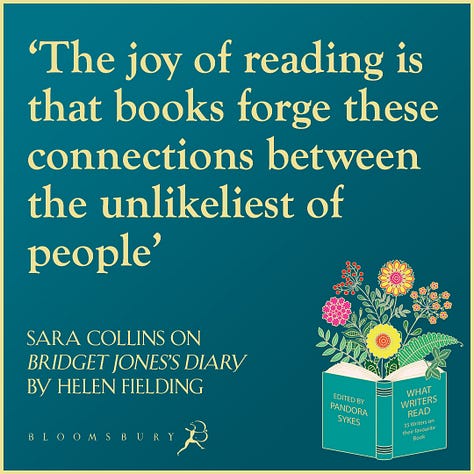
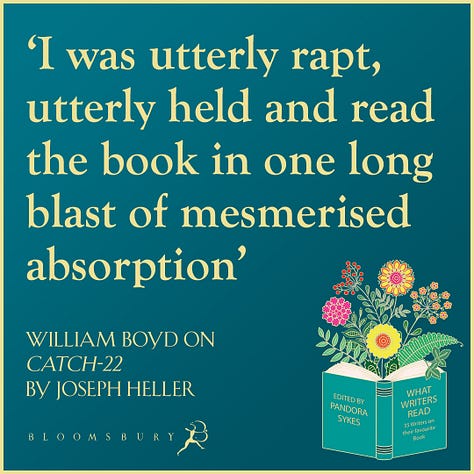
There is a newspaper slot that I love, where authors are asked about the book they wish they had written, that made them laugh, that made them cry, and so on. I read it with a tab open on my favourite online second-hand bookshop, adding to my basket as I read. Knowing an author’s favourite book feels like a delicious piece of insider information - like peeking behind their brain curtains to see the cogs turning within. It’s highly unlikely that reading said book will confer a similar set of writing skills, but being in the same reading space that your favourite author has dwelt in is a lovely sort of alchemy. Why not create a whole book of moments like this? I thought. And so, here we are.
Over 413,000 children and young people in the UK don’t own a book.
This deprives them of education, but also of a means to escape: into a fantasy world from which they are able to better understand and navigate ‘real’ life. When I think of myself as a child, I think of myself on my own with a book, filling myself up with the energy to face the world. Alone, but never lonely. Children who have access to books are three times more likely to experience mental wellbeing as adults. Quite frankly when I consider how much books have given me - and, at times, saved me - that feels like a conservative estimate.
All the profits and royalties from this book will go to the National Literacy Trust, which works to end literacy inequality. Nearly 800 public libraries have been shuttered in the UK in the last 10 years: safe, communal places where young people can gather, read, be.
The decline in shared, free spaces is rarely front page news, but that does not mean it is not an emergency.
When we think of a library, we usually think of a huge, vaulted room with floor-to-ceiling books. But a library does not have to be enormous; research has found that just 80 books can make a child feel enriched. Through their Primary School Alliance, the National Literacy Trust aims to create 1,000 new libraries in primary schools, each with their own librarian, to curate and rotate the books. Working with local communities, they have also opened ‘literary hubs’ in lower-income communities across the UK. National Literacy Trust hubs bring together local partners to tackle literacy issues in communities across the UK where low levels of literacy are seriously impacting on people’s lives.
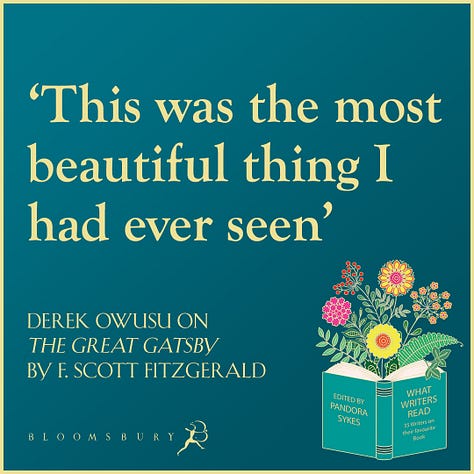
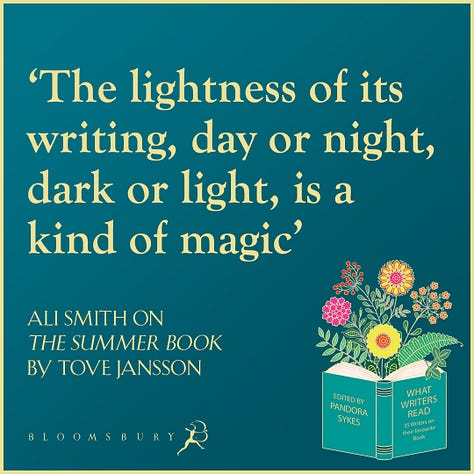

The beauty of these 35 entries that you are about to read - or dip into whenever you have a spare few minutes on the loo/ in the bath/ in bed before nodding off, which is how I very much hope this book will be consumed, with its pages water-wrinkled and stained with peanut butter - is the specific personal detail that each author brings.
Elif Shafak writers about the solace and freedom she found in Virginia Woolf’s fluid Orlando, as a young bisexual woman growing up in conservative Turkey. Nick Hornby writes about escaping into Erich Kästner’s Emil and the Detectives aged 11, as his father prepared to leave the family home for his other family. Marian Keyes writes about the book that lifted her when she was suicidal. Emma Dabiri marvels at how changed you can find yourself as a reader, to return to a book you were bored by 12 years earlier, and find it so nourishing, so personally resonant.
It was important that these contributions are not book reports (there’s Goodreads for that), but a snapshot into the writer as a person, told through the book that they were reading at that time.
Some of these entries, such as Lisa Taddeo on the book she read during the emotional rollercoaster of her first postpartum hangover, will make you laugh out loud. Others, like George the Poet on Malcolm Gladwell’s influence on the social-academia of his award-winning poetry, will make you think. Some resisted my brief, by which I was delighted: Fatima Bhutto wrote about a bookshelf of books, because it is a fool’s errand to choose one.
I know what she means. I wrote the brief, so I should surely plant my flat in the sand, but when I think about the books that changed me, my mind crowds with about 10 different highly specific instances. On my single bed aged 10, in floods of tears, reading Goodnight Mister Tom by Michelle Magorian. On a bus aged 17, shivering, as I got to the twist in We Need To Talk About Kevin by Lionel Shriver. In a writing hut, ignoring my book deadline, gobbling When I Hit You by Meena Kandasamy over one long insomniatic night.
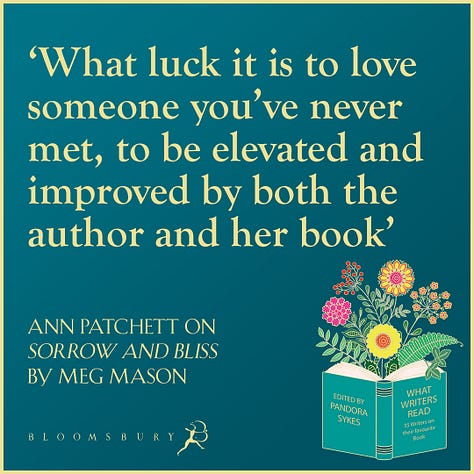

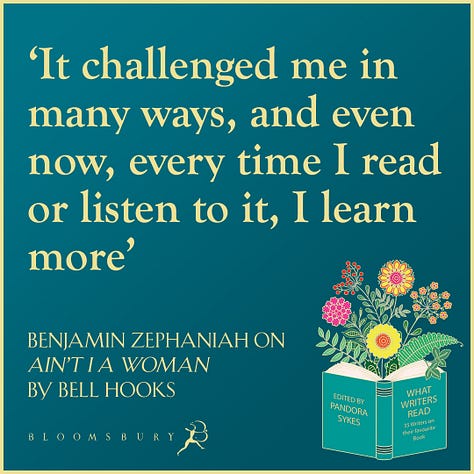
I have a reputation for reading the ‘wrong’ thing at the ‘wrong’ time: the girthy Riders by Jilly Cooper in RE class at my all-girls convent school; Leïla Slimani’s gut-punching Lullaby whilst heavily pregnant with my first child. (For her contribution to this anthology, Leïla has written about another book that cracked open my teenage brain like a walnut: The Unbearable Lightness of Being by Milan Kundera.)
I like reading ‘a frothy summer read’ in the dead of winter and ‘a serious work of non-fiction’ on a sun lounger. Books should not be siloed into times of year or personality types. Reading widely benefits all of us, but it should not be didactic. What you enjoy should not be filtered or apologised for. Quite frankly, life is too short to force yourself to finish a book - or stop yourself returning to a favourite. (Surreally, I was re-reading David Nicholls’s One Day for possibly the tenth time when his entry landed in my inbox.)
A friend of mine recently remarked upon how ‘starry’ the list was, with its prizewinners and shortlisted authors. It’s true that many of these writers are bona fide literary stars - and I am still in shock that they all agreed to write a piece, entirely for free, despite their calendars and status. But in this collection, they are simply readers. To go one further, they are writers because they are readers. Which is why we must think of the next generation of readers, many of whom are growing up without as much access to books.
As Margaret Atwood said last year, “If there are no young readers and writers, there will shortly be no older ones. Literacy will be dead, and democracy, which many believe goes hand in hand with it - will be dead as well.”
Thank you for buying a copy of this book and supporting the great work of The National Literacy Trust. I hope you enjoy what you find.
So there you go, cherished Substack readers. I hope you enjoy what you find - both on here, and in there. I’ll be back on Friday.






I bought the hard copy on release and it's great. A true vignette of storytellers favourite titles. Definitely a stocking filler or to replace a bottle wine for a host. All for a great cause!
Can’t wait to read this!
And, I also remember exactly where I was when I read that twist in We need to talk about Kevin. I wonder if a twist could blindside us like that these days what with social media and all its spoilers?